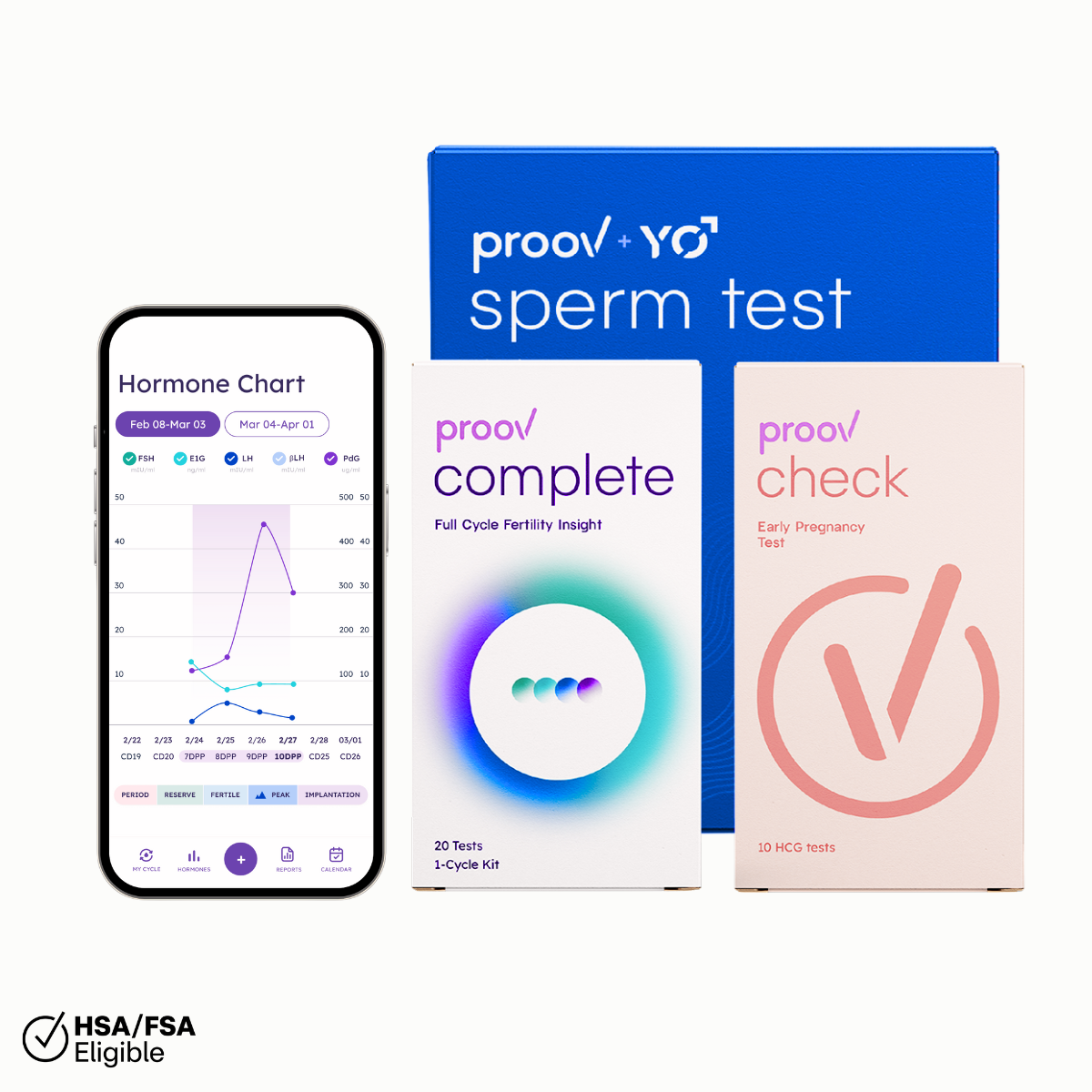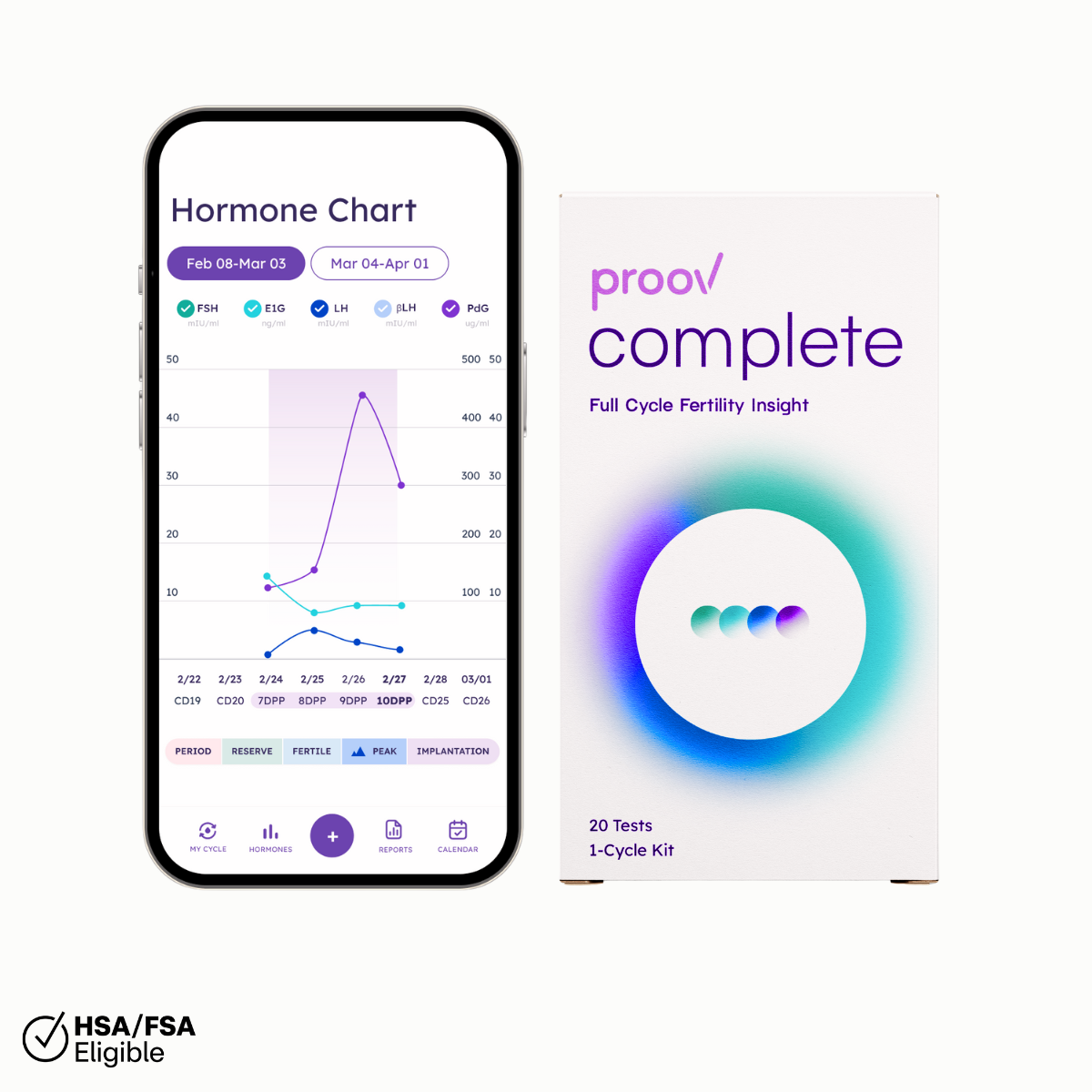Written by: Dr. Amy Beckley, PhD, Founder and Inventor of the Proov test — the first and only FDA-cleared test to confirm successful ovulation at home.
Written on 10/15/21

Many couples trying to conceive remain unaware that progesterone may be an important piece of their pregnancy puzzle.
In general, progesterone doesn’t get a lot of attention. Many couples trying to conceive remain unaware that progesterone may be an important piece of their pregnancy puzzle.
Here at Proov, it’s no secret we love progesterone. However, recently we’ve seen progesterone get a little bit of a bad rep, specifically in terms of high progesterone levels.
We’d like to clear progesterone’s name and help you better understand the potential risks associated with high progesterone (and whether or not they’re true!).
What is progesterone and why is it important?
Progesterone — one of the two main female sex hormones — plays a crucial role in regulating our cycles, implantation, and pregnancy, just to name a few.
During the follicular phase (the first half of your cycle), progesterone levels are expected to be low. Once ovulation occurs and marks the transition to the luteal phase, the empty follicle — now called the corpus luteum — produces progesterone. This hormone prepares the uterine lining for implantation and pregnancy by making it “sticky” enough to allow the embryo to actually implant.
Given sperm fertilizes an egg to create an embryo, this embryo has a limited period of time to implant into the uterine lining. The “implantation window” lasts about 4 days total, most likely from days 7 through 10 past peak fertility.
During the implantation window, progesterone levels need to be elevated to a healthy level so that the uterine lining can be receptive to an embryo. In fact, studies show that women with high progesterone during luteal phase are 92% more likely to have a live birth than women with low levels.
If the embryo successfully implants and you conceive, the corpus luteum continues producing progesterone through pregnancy. Around the beginning of the second trimester, the placenta takes over progesterone production once it’s fully developed.
Throughout the entire pregnancy, progesterone helps prevent preterm uterine contractions, and along with estrogen, controls the growth and development of the growing baby. It also helps supply the uterus and baby with necessary nutrients.
However, progesterone’s importance extends beyond conception and pregnancy. As with other hormones, you need healthy progesterone levels to have a healthy hormonal balance.
From your first period until you reach menopause, progesterone keeps your cycle healthy and counteracts the effects of estrogen. Progesterone also impacts your mood and general wellbeing, and low levels may cause premenstrual syndrome (PMS) symptoms, anxiety, and depression. Progesterone is also a neurosteroid, which helps protect the brain from damage and speeds up recovery after injury.

Progesterone also impacts your mood and general wellbeing, and low levels may cause premenstrual syndrome (PMS) symptoms, anxiety, and depression.
What is the ideal progesterone level?
The ideal progesterone level depends on where you are in your cycle!
During the follicular phase when estrogen should be dominant, progesterone keeps a low profile and typically doesn’t get higher than 1-1.5 ng/ml. This is your baseline progesterone level.
As we mentioned, progesterone increases after ovulation occurs, during the luteal phase. Progesterone needs to remain adequately elevated during this phase — specifically during the implantation window — to allow for a healthy luteal phase and the best possible chance at pregnancy (if you’re TTC, of course).
But what is the optimal level of progesterone when it comes to a healthy luteal phase and conception? Most doctors say a level of at least 10 ng/ml in blood. However, measuring progesterone in blood can be tricky.
Your body releases progesterone into the bloodstream in pulses, meaning progesterone blood levels can fluctuate a lot. According to recent studies, progesterone can fluctuate up to 8-fold in a single 90-minute period — that’s a huge difference!
This means you could get very different results if you were to get your blood tested in the morning versus in the evening. Additionally, we know that progesterone levels need to remain elevated for the entire implantation window to allow for the best possible chance at conception.
However, most clinics will test your levels in blood just once, around cycle day 21 (roughly 7 days after ovulation). One single blood draw above 10 ng/ml can confirm ovulation, but unfortunately does not tell you much about your levels overall.
This is why many doctors consider one single blood test to be non diagnostic. Ideally, you want an average of 10 ng/ml (at minimum) over 3 separate tests during the mid-luteal phase. But who wants to get poked with a needle three days in a row? (Not us!)
Luckily, there’s a non-invasive way of tracking levels over the implantation window: PdG testing. PdG, a urine marker of progesterone, levels in first morning urine correlate to an average of the previous day’s progesterone levels. You can measure PdG levels with an at-home test like Proov Confirm.
If you do not conceive that cycle, progesterone levels will drop and trigger the arrival of your period. If you do conceive and implantation occurs, progesterone levels will remain elevated throughout pregnancy.
Ideal progesterone levels in pregnancy are as follows, according to the American Pregnancy Association:
- Mid-luteal phase: 1-28 ng/ml (average is over 10 for un-medicated cycles and over 15 in medicated cycles)
- 1st Trimester: 9-47 ng/ml
- 2nd Trimester: 17-146 ng/ml
- 3rd Trimester: 49-300 ng/ml

If you do conceive and implantation occurs, progesterone levels will remain elevated throughout pregnancy.
Is there such a thing as too high progesterone?
Usually, problems with progesterone occur when levels are too low, rather than too high. While there are theories that high progesterone may cause problems, the scientific research says different.
Congenital adrenal hyperplasia (CAH)
CAH is an adrenal condition which affects hormone production. In many cases, patients with CAH also have high progesterone in follicular phase, which leads many people to believe that high progesterone causes CAH. In fact, studies show causes of high progesterone in follicular phase are instead a symptom, and sometimes an indicator, of CAH.
Hypospadias
Hypospadias is a birth defect among male infants where the opening of the urethra is not on the tip of the penis. One study associated hypospadias with a high progestin (a synthetic form of progesterone) intake during pregnancy.
However, this theory remains unsupported by the Center for the Study and Treatment of Hypospadias of the University of San Francisco (USF), which provides clinical excellence in the treatment of hypospadias and leads research in the study of this defect.
The center at USF focuses on the idea of genetic susceptibility and considers exposure to certain endocrine disruptors — specifically estrogens and phytoestrogens — as a possible trigger of the disease during urethral development. This may explain the higher prevalence of infants born with hypospadias among vegetarian mothers, who are often exposed to higher levels of estrogenic substances in their diet.
Increased risk of breast cancer
A small increase in risk in breast cancer has been observed in patients who reported a high intake of synthetic progestins — keep in mind progestins are different from the progesterone naturally occurring in your body.
Information about the risk of breast cancer associated with isolated progesterone or progestin use is extremely rare. Combined oral contraceptives have been associated with a small increase in breast cancer risk, but these pills also contain estrogen, which is responsible for the proliferation of cancer cells in breast cancer. Overall, science shows us that progesterone plays a protective role against breast cancer.
Most doctors say that the benefits of progesterone outweigh the risks of your levels being too high, especially if you are trying to conceive. If you have concerns about progesterone, we always recommend consulting your doctor.













